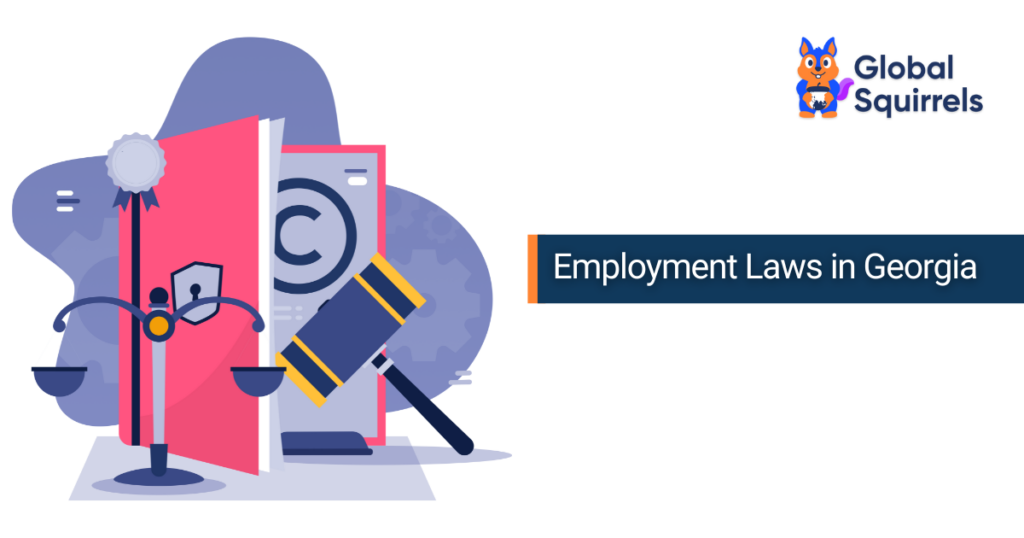A deep dive into the employment laws in the country of Georgia

If you plan to hire employees in the country of Georgia, there are certain employment laws that you have to acquaint yourself with. The country has access to affordable and skilled talent, which is advantageous to your business. The knowledge of the employment laws is essential to avoid violating them. It may sound obvious, but the best way of avoiding problems with the law is to become fully informed about the rules governing leave, working hours, overtime, and taxation of employees.
This blog aims to provide an overview of the key employment laws in Georgia. Additionally, we will delve into the employment termination and onboarding laws, offering valuable insights for businesses looking to hire talent in this country and how Global Squirrels helps your business comply with labor laws in the country of Georgia.
3 reasons that make the country of Georgia a great resource destination
Hiring in Tbilisi, Georgia, presents several strategic advantages for companies looking to hire talent. Let us discuss why you should employ talent in Georgia.
1. Skilled workforce
Georgia has a very educated and skilled workforce in industries such as engineering, IT, and hospitality. The country generates a large pool of graduates from reputable universities, making it easier for employers to find candidates with the right skills for all kinds of roles.
2. Cost-effective labor
Georgia’s labor costs are more affordable than in many Western countries. This affordability also means that it is an attractive option for your business to optimize operational expenses by hiring talent without compromising on quality.
3. Growing English proficiency
The younger population in Georgia is becoming increasingly proficient in English, especially in urban areas like Tbilisi. This trend facilitates better communication and integration for international companies hiring local talent.
What are some key employment laws in the country of Georgia?
The country of Georgia has several essential employment laws that govern working hours, overtime, and leave policies. Below are the key aspects of these laws:
Leaves
1) Paid & unpaid leaves:
- Employees have the right to 24 working days of paid leave and 25 working days of unpaid leave annually.
2) Maternity leave:
- Female employees are allowed to take paid leaves of up to 140 calendar days.
3) Additional paid leave for employees
- Employees working in environments deemed arduous, harmful, or hazardous will be granted 10 calendar days of additional paid leave per year.
- Employees who participate in actions related to martial law or a state of emergency will be eligible for up to 15 calendar days of additional paid leave, but only once after the emergency ends.
- Employees returning to Georgia after completing a rotation period in a peacekeeping operation will receive 30 calendar days of additional paid leave.
Working hours
Standard working hours:
- Weekly limit: Employees generally work for 40 hours per week.
- Flexibility for specific industries: Certain industries requiring continuous production may have a weekly limit of 48 hours, but this requires government approval.
Accommodation for persons with disabilities:
- Legal representatives or supporters of individuals with disabilities may request an additional paid rest day per month or negotiate alternative working arrangements.
Overtime
Overtime is work performed beyond the regular working hours, as agreed upon by the employee and employer.
Payment for overtime:
- Overtime work is paid at an increased hourly rate.
- The amount is precisely determined by mutual agreement.
- The monthly salary includes overtime pay, which is paid after the overtime work is over.
Notification of overtime:
- The employer must give the employee notice of up to 1 week of overtime work in advance.
- Exceptions may be made if there is an urgent need for overtime.
What are the Georgia employment termination laws?
Georgia’s labor law provides specific grounds for employers to terminate labor relations with employees. These grounds can be broadly categorized into:
1. Employee misconduct:
- Absence from work: Excessive absences without a valid reason can be grounds for termination.
- Performance issues: Persistent failure to fulfill job duties or repeated violations of company policies or laws.
- Serious breaches: Committing a severe violation of the employment agreement or causing significant damage to the employer.
- Criminal convictions: Being convicted of a crime that makes it impossible to perform job duties.
- Incapacity: Being legally incapable or incapacitated for work.
2. Economic reasons:
- Reduction of workforce: During economic downturns, restructuring, and other reasons, employers may terminate their employees.
3. Employee incapacity:
- Temporary or permanent incapacity: Employers may suspend or terminate labor relations because of an employee’s temporary or permanent incapacity to work.
4. Employer circumstances:
- Employer’s incapacity or absence: In some instances, the employer may have to suspend the labor relations even when it has been disabled or is absent.
5. End of employment term:
- Fixed-term contracts: It means that if your employees work in a fixed-term contract, the employment relationship comes to an end automatically at the end of the agreed-upon term.
Important considerations:
- Notice periods: In some cases, employers may be required to give employees notice prior to termination.
- Severance pay: It is not mandatory, but employers can offer severance pay.
- Prohibited reasons: Employers cannot terminate labor relations based on discriminatory reasons, such as race, gender, religion, or disability.
How can Global Squirrels assist you with complying with employment laws in Georgia?
Global Squirrels offers comprehensive solutions to assist you in complying with employment laws in Georgia through our Employer of Record (EOR) solution. Global Squirrels is a staffing and payrolling platform specializing in helping you hire top talent and handling various HR functions, such as complying with employment laws in Georgia, managing payroll & benefits, and more.
Global Squirrels offers all this cost-effectively, saving you resources like time and costs. Compared to other EORs, our platform eliminates huge markups, allowing you to save up to 20% on hiring. Our staffing platform ensures that you hire candidates who meet all your business requirements by providing pre-screened profiles with verified backgrounds, allowing you to choose and help conduct interviews within 2 to 5 business days.
While our staffing platform allows you to hire professionals who meet your requirements, our platform also manages the following HR functions:
Streamlined compliance management
Global Squirrels manages compliance with all employment laws, which can be complex and vary significantly across jurisdictions in Georgia. Global Squirrels, as your EOR in Georgia, will ensure adherence to regulations regarding hiring, payroll, taxes, and employee benefits, redhirreucing the risk of legal complications associated with remote employment.
Payroll administration
Our platform handles payroll by promising you on-time payments that are accurate and consider factors like unpaid leaves. Our platform pays your employees through a secured payment system that is federally regulated. In addition to this, our platform also handles timesheets that track all the employee’s leaves and deliverables without any hassle. Our platform manages your employees’ payroll while adhering to all of Georgia’s payroll laws and regulations.
Offering attractive employee benefits
Our staffing platform provides access to competitive benefits plans to meet the requirements of Georgia’s labor laws. This is crucial for attracting top talent by giving you a competitive edge in the job market. This is done by offering your potential employees perks that give them job satisfaction while also motivating them to work long-term.
Request a demo today to learn more about how you can leverage our Employer of Record in Georgia to hire workers and comply with the employment laws in Georgia.
